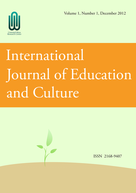


Volume 13 Issues 3-4 (2024-12-31)
Volume 13 Issues 1-2 (2024-06-30)
Volume 12 Issues 3-4 (2023-12-31)
Volume 12 Issues 1-2 (2023-06-30)
Volume 10 Issues 1&2 (2021-06-30)
Volume 9 Issues 3&4 (2020-12-31)
Volume 9 Issues 1&2 (2020-06-30)
Volume 8 Issues 3&4 (2019-12-31)
Volume 8 Issues 1&2 (2019-06-30)
Volume 7 Issues 3&4 (2018-12-31)
Volume 7 Issues 1&2 (2018-06-30)
Volume 6 Issues 3&4 (2017-12-31)
Volume 6 Issues 1&2 (2017-06-30)
Volume 5 Issues 3&4 (2016-12-31)
Volume 5 Issues 1&2 (2016-06-30)
Volume 4 Issues 3&4 (2015-12-31)
This study investigated factors influencing students' engagement in Chinese college English classrooms and explored measures to enhance it. A total of 246 students participated in a questionnaire survey, and 17 teachers were interviewed. The results indicated that English proficiency had a significant impact on students' classroom engagement levels. Students' perceptions of their classmates' engagement levels and the importance they placed on classroom engagement were strong predictors of their own engagement levels in EFL classrooms. Key factors contributing to high levels of engagement included attractive teaching methods, positive influence from classmates, strong interest in English learning, the teacher's personal charisma, a strong sense of responsibility, and high expectations from teachers and parents. The only significant factor leading to low levels of engagement was dull content. Fun teachers, interesting teaching content, and a relaxing classroom atmosphere were found to increase student engagement levels. Given that students' English proficiency directly affected their participation in EFL classrooms, teachers should adopt different approaches to enhance engagement levels among students with varying proficiency levels.